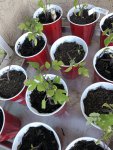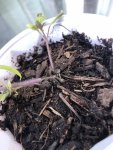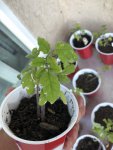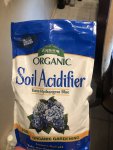- Joined
- Apr 30, 2021
- Messages
- 11
- Reaction score
- 6
- Country

Hi everyone, I’m planning on starting some vegetables outdoors soon and will be growing them organically. I’m new to vegetable gardening and still learning, my first batch of indoor seedlings didn’t make it and my second batch has done better, but unfortunately several of them have dampened off. They actually dampened off at a more mature stage (check the pics) so I’m guessing its the soil that did it, I watered the remaining plants that aren’t showing signs of it with a water/hydrogen peroxide mix to see if it stops them from developing it.
They’re in Dr. Earth organic vegetable garden soil and I think all of the organic material in their soil probably caused this to happen, especially because I’ve had a pretty bad problem with fungus gnats from this soil too. Another mistake I think that I made is putting them directly into that soil instead of starting them in Dr. Earth seed starting soil. I’m planning on starting some corn and carrots soon, plants that you don’t start indoors and I want to be sure that the soil is properly amended before the seeds are planted. I tested the pH of the soil and its at 8, so I bought a bag of this soil acidifier in the pic and mixed it into the soil, along with watering it with a water/vinegar mix to lower the pH to the optimal level. As for fungal issues with the soil, I was thinking of amending it with turmeric powder since several sites online said it works as a great antifungal for gardening, has anyone tried this and had good results? And should I also amend the soil with Dr. Earth organic compost prior to planting the seeds? I’ve heard that it can be beneficial to amend with compost and I was wondering if that’s true.
They’re in Dr. Earth organic vegetable garden soil and I think all of the organic material in their soil probably caused this to happen, especially because I’ve had a pretty bad problem with fungus gnats from this soil too. Another mistake I think that I made is putting them directly into that soil instead of starting them in Dr. Earth seed starting soil. I’m planning on starting some corn and carrots soon, plants that you don’t start indoors and I want to be sure that the soil is properly amended before the seeds are planted. I tested the pH of the soil and its at 8, so I bought a bag of this soil acidifier in the pic and mixed it into the soil, along with watering it with a water/vinegar mix to lower the pH to the optimal level. As for fungal issues with the soil, I was thinking of amending it with turmeric powder since several sites online said it works as a great antifungal for gardening, has anyone tried this and had good results? And should I also amend the soil with Dr. Earth organic compost prior to planting the seeds? I’ve heard that it can be beneficial to amend with compost and I was wondering if that’s true.





